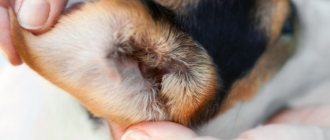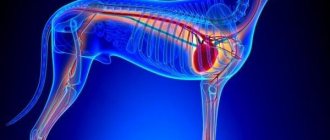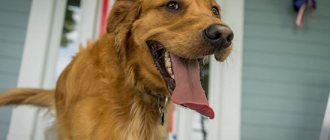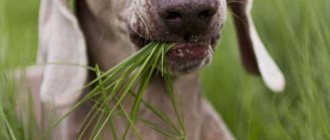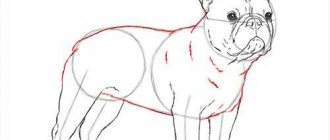The French Bulldog is a dog with a recognizable appearance that cannot be confused with the appearance of other varieties of bulldogs.
“Frenchies” belong to the decorative breeds and are suitable for keeping in an apartment, while they are quite powerful and stocky, with strong bones, developed muscles and a fighting character.
Despite their quite good health, dogs of this breed are prone to allergies, and most often this is how they react to inappropriate nutrition. Owners should be aware of the symptoms of the disease in order to provide first aid to their pet if necessary.
This will be discussed in the article - you will learn about the causes of allergies and methods of treating them, and you will also see in the photo how it can manifest itself externally.
Types and causes of allergies
Allergies in French bulldogs can be triggered by many factors - from eating allergenic foods to using inappropriate dog grooming products
Food
Due to the rejection of certain types of protein by the immune system of French bulldogs, inclusion of their sources in the diet is fraught with the development of allergies.
When creating a menu or choosing food for your pet, you should avoid the presence of:
- chicken meat;
- seafood;
- eggs;
- dairy and fermented milk products;
- yeast and soy;
- corn;
- red vegetables and fruits;
- vegetable oils;
- fish oil.
Food allergies have a cumulative effect, which complicates the process of identifying the allergen.
Expert opinion
Tolkachev Andrey Mikhailovich
veterinarian
Allergies are a major problem in French Bulldogs. I advise you to carefully monitor your dog after eating and if any negative reaction occurs - rash, redness, itching - immediately change the food or remove the product that caused it from the diet. And there is no need to treat the animal yourself - immediately contact a veterinarian.
Also read about how to properly feed a French bulldog puppy.
Medicinal
Among medications, antibiotics are especially dangerous; you should also be wary of:
- barbiturates;
- quinine;
- pyramidon;
- morphine;
- chloral hydrate;
- brewer's yeast;
- alfalfa extract;
- novocaine;
- vitamin B1.
In addition, preparations with live bacteria, as well as flower and bee pollen, pose a danger.
Chemical
The development of contact dermatitis in a French bulldog can be triggered by the use of shampoo and soap that is inappropriate for washing your pet. It is necessary to use only hypoallergenic hygiene products.
IMPORTANT!
Household chemicals can also cause a negative reaction, so access to them should be prohibited.
Autoallergy
This type of allergy is caused by autoimmune diseases, which cause the dog's body to produce its own allergens.
You can get rid of them only after accurately identifying the disease that caused disruptions in the immune system.
For owners
“Frenchies” can react with contact dermatitis to human hair, epithelial particles and dandruff.
You can reduce the risk of developing an allergic reaction in this situation by limiting close contact with your pet.
Other irritants
Rarely, but still there are cases of allergic reactions to dander and animal hair, including your own, parasite and insect bites, viruses and helminths.
Diagnostics in a veterinary clinic
The diagnosis is preceded by appropriate diagnostic measures, which are carried out in a veterinary clinic.
First, the veterinarian collects an anamnesis, which will help him get the most accurate picture of the disease and allow him to find out the nature of the allergen. The specialist should find out from the owner the age when dermatitis was first noticed, the frequency of relapses, the severity of symptoms, dependence on the seasons, as well as information about the parents and other puppies from the litter.
The doctor is also interested in issues of keeping and caring for the dog: regime, living in the house of other pets, parasitic treatment, the possibility of street living, feeding, use of medications and even the nature of the bedding.
Despite the rather striking symptoms, atopic dermatitis is often confused with other skin diseases, so it must be identified from contact dermatitis, urticaria, food allergies, and reactions to flea bites.
To be able to make an accurate diagnosis and prescribe adequate therapy, the veterinarian will need to examine the skin scraping, determine the level of fungal microflora, and the level of hormones in the blood. Also necessary diagnostic methods include studies of general and biochemical blood tests, urine and stool tests.
If necessary, diagnostics are carried out using a UV lamp (if the dog is suspected of having lichen), a skin biopsy (if cancer is suspected), etc.
To exclude food allergies, the dog is put on a strict diet for at least 6 weeks.
Most common symptoms
Most dog breeders do not attach importance to the first symptoms of the disease, mistaking them for the dog’s normal behavior.
Due to allergies, the “French” suffer primarily from the skin, which manifests itself in:
- redness and inflammation;
- constant itching, forcing the pet to scratch the skin until it bleeds;
- the appearance of a rash in the form of ulcers and blisters;
- sweating underarms;
- local baldness;
- unpleasant odor;
- dry epidermis, dandruff.
It is necessary to pay attention to where the itching is concentrated. Scratching by a pet of the perineum or the area at the base of the tail indicates infection with parasites or an allergy to flea bites, and itching in the nose, ears, and abdomen is a sign of atopic dermatitis.
Also, when an allergy occurs, the dog develops discharge from the nose and eyes, and conjunctivitis develops.
NOTE!
The most striking and accurate symptom of allergies in a French Bulldog is persistent ear infections.
In addition to the manifestation of certain symptoms, the behavior of the French bulldog also changes - the dog becomes nervous, shows anxiety, scratches, licks or gnaws at areas where irritation is localized, and shakes its head. With allergic inflammation on the paws, the “Frenchie” experiences pain and begins to limp.
There are cases when allergic enteritis causes symptoms of food poisoning:
- nausea and vomiting, in which foam and bile are released from the mouth;
- bloating, colic, frequent release of gases;
- diarrhea, the appearance of mucus in the stool.
An extreme symptom of an allergy is anaphylactic shock .
If you suspect an allergic reaction, you should take your dog to the veterinarian as soon as possible. Lack of necessary treatment can be fatal.
Behavior Changes
How can you tell if your French Bulldog puppy is allergic to something? External signs are described above, here we will look at behavioral changes.
- A puppy or adult dog is constantly nervous.
- The animal becomes irritable, snaps when you touch it or dodges an outstretched hand.
- The pet is constantly itching and licking bothersome areas.
- In some cases, the “Frenchman” shakes his head, as if there is a foreign object in his ears that the dog wants to get rid of.
First aid
You can reduce the itching and pain of your pet if allergic inflammation occurs between the toes by diluting white vinegar with water and wiping the affected areas with this solution.
Rubbing with cool water will help you cope with itching on your dog’s body; the effect lasts for about half an hour.
CAREFULLY!
This method can only be used in hot weather, otherwise your French Bulldog will get a cold.
If your dog starts vomiting with foam, you should skip the next feedings and give your pet something to drink instead of food several times a day. The vomiting must stop, otherwise you cannot postpone the visit to the doctor - you must be tested for toxins and prescribed antiemetic drugs.
In case of allergies, manifested by dandruff and increased dry skin, you should remove the cosmetics currently used in caring for your pet.
Drug treatment
When wounds appear on the dog’s skin, they need to be lubricated with brilliant green or Mastieth Forte - this promotes speedy healing, and in the case of severe allergic dermatitis, Chaga balm or a mixture of equal parts of Sinaflan and baby cream helps.
Also, for the treatment of allergies, the use of antihistamines, for example “Diazolin” or “Suprastin”, treatment of the ears with the “Stop Itching” spray and the drug “Karsil” to remove toxins from the liver are prescribed.
To treat food allergies in French bulldogs, a stepwise system of homeopathic medications is used:
- "Engistol" - regulates venous circulation;
- “Traumel” – regenerates damaged cellular structures;
- "Cardus compositum" - normalizes the detoxification function of the liver;
- “Coenzyme compositum” – restores the activity of cellular enzymes;
- "Mucosa compositum" - prescribed for tissue therapy;
- “Echinacea compositum” and “Nux vomica-Homaccord” are prescribed for demodicosis and dermatitis.
The drugs must be injected subcutaneously into the neck or withers of the dog; the drug is released in 5 ml ampoules.
The dosage of drugs depends on the weight of the pet and is prescribed only by a veterinarian.
Hypoallergenic food
It is necessary to avoid economy-class food containing chemicals, flavors and dyes that have a negative impact on the health of the Frenchie.
Food from Purina HA Diet and DVM Exclude is suitable - the proteins in them are broken down and do not harm dogs. Hill's Prescription Diet – Canine Z/D also does not cause allergic reactions.
For French bulldogs with increased sensitivity, balanced foods from companies such as:
- Nature's;
- Recipe Innovative;
- Veterinary Diets.
IMPORTANT!
When choosing food that is suitable for your pet, you cannot suddenly replace one with another. This must be done gradually, using fasting or fasting days.
Do you need a diet?
Food allergies and intolerance to certain foods occur more often in French bulldogs than in other breeds.
If you suspect a food allergy, you should put your pet on an elimination diet, which is based on excluding foods from the dog’s diet that can trigger the development of an allergic reaction.
During the first 3-4 days, give the dog only empty rice or buckwheat, then add boiled turkey to the porridge. You need to stick to this diet for 2 weeks.
This diet provokes disruptions in the gastrointestinal tract, so at the beginning of the 3rd week you need to add low-fat kefir or fermented baked milk to your pet’s diet.
If after 3 weeks there are no signs of allergy, you should introduce one of the products suspected of having allergens into the dog’s menu, then after 1-2 weeks - another one, and continue this until the product causing the allergy is detected.
NOTE!
The allergy could be caused by greens or flowers that the dog ate while walking. It is important to monitor your pet during walks and not allow him to eat anything.
Which breeds are more susceptible
Atopic dermatitis affects young dogs between 1 and 5 years of age, but can be diagnosed earlier. The first symptoms of dermatitis appear at six months of age, when the allergen enters the body and causes the immune system to produce neutralizing antibodies, then the pathology recurs throughout life.
The risk group includes representatives of such breeds as bulldogs (French, American), boxers, cocker spaniels, pugs, sharpeis, beagles, poodles, golden retrievers, Labradors, German shepherds, chow-chows, setters (English, Irish).
However, this does not mean that other breeds are not susceptible to this disease.
Preventive measures
To prevent allergies, it is necessary to protect the French bulldog from any contact with products and substances that provoke its development and to carry out timely treatment against fleas, ticks and helminths.
It is necessary to monitor the dog's diet, especially before it turns 6 months old - it is puppies that most often react negatively to food. It is important to immediately train your pet not to ask for food from the table and to ensure that family members or guests do not give him prohibited foods as treats.
Sometimes allergic reactions in French bulldogs occur even with a balanced diet, which is associated with the accumulation of toxins in the animal's liver.
Once every few months, it is recommended to carry out a preventive course of nutrition consisting of rice or buckwheat and meat. To avoid the accumulation of toxins in the pet’s liver, this diet should be supplemented with the use of the drug “Karsil” in the dosage specified by the veterinarian.
How to treat a dog?
To alleviate the condition and treat the French bulldog, it is necessary to exclude its contacts with provoking factors, begin drug therapy and adjust the dog’s diet if foods that are allergic to it are identified.
As an ambulance (before a visit to the veterinarian), the following activities are carried out:
- Itchy red spots on the ears, paws, chest and other places are treated with a cloth soaked in cold water and vinegar.
- If vomiting, give as much water as possible.
- For acute reactions, use Suprastin or Loratadine.
Drug treatment begins after a veterinarian's prescription. Bulldogs are prescribed medications:
- antihistamines;
- means for external treatment of wounds;
- absorbent - to remove toxins from the body;
- antipruritic sprays or ointments;
- bifidobacteria to restore the functioning of the gastrointestinal tract;
- homeopathic remedies - to restore liver function and strengthen the immune system.
Specific medications and their dosage are prescribed by the doctor after conducting tests and identifying substances that are dangerous for the allergic person.
